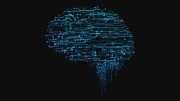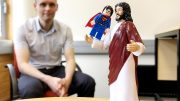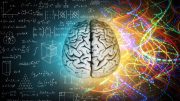
Research data shows children’s beliefs tend to align with patterns they unconsciously absorb from their environment. This influence persists into adulthood, causing beliefs to increase even in nonreligious households and decrease even in religious households.
Individuals who can unconsciously predict complex patterns, an ability called implicit pattern learning, are likely to hold stronger beliefs that there is a god who creates patterns of events in the universe, according to neuroscientists at Georgetown University.
Their research, reported in the journal, Nature Communications, is the first to use implicit pattern learning to investigate religious belief. The study spanned two very different cultural and religious groups, one in the U.S. and one in Afghanistan.
The goal was to test whether implicit pattern learning is a basis of belief and, if so, whether that connection holds across different faiths and cultures. The researchers indeed found that implicit pattern learning appears to offer a key to understanding a variety of religions.
“Belief in a god or gods who intervene in the world to create order is a core element of global religions,” says the study’s senior investigator, Adam Green, an associate professor in the Department of Psychology and Interdisciplinary Program in Neuroscience at Georgetown, and director of the Georgetown Laboratory for Relational Cognition.
“This is not a study about whether God exists, this is a study about why and how brains come to believe in gods. Our hypothesis is that people whose brains are good at subconsciously discerning patterns in their environment may ascribe those patterns to the hand of a higher power,” he adds.
“A really interesting observation was what happened between childhood and adulthood,” explains Green. The data suggest that if children are unconsciously picking up on patterns in the environment, their belief is more likely to increase as they grow up, even if they are in a nonreligious household. Likewise, if they are not unconsciously picking up on patterns around them, their belief is more likely to decrease as they grow up, even in a religious household.
The study used a well-established cognitive test to measure implicit pattern learning. Participants watched as a sequence of dots appeared and disappeared on a computer screen. They pressed a button for each dot. The dots moved quickly, but some participants – the ones with the strongest implicit learning ability – began to subconsciously learn patterns hidden in the sequence, and even press the correct button for the next dot before that dot actually appeared. However, even the best implicit learners did not know that the dots formed patterns, showing that the learning was happening at an unconscious level.
The U.S. section of the study enrolled a predominantly Christian group of 199 participants from Washington, D.C. The Afghanistan section of the study enrolled a group of 149 Muslim participants in Kabul. The study’s lead author was Adam Weinberger, a postdoctoral researcher in Green’s lab at Georgetown and at the University of Pennsylvania. Co-authors Zachery Warren and Fathali Moghaddam led a team of local Afghan researchers who collected data in Kabul.
“The most interesting aspect of this study, for me, and also for the Afghan research team, was seeing patterns in cognitive processes and beliefs replicated across these two cultures,” says Warren. “Afghans and Americans may be more alike than different, at least in certain cognitive processes involved in religious belief and making meaning of the world around us. Irrespective of one’s faith, the findings suggest exciting insights into the nature of belief.”
“A brain that is more predisposed to implicit pattern learning may be more inclined to believe in a god no matter where in the world that brain happens to find itself, or in which religious context,” Green adds, though he cautions that further research is necessary.
“Optimistically,” Green concludes, “this evidence might provide some neuro-cognitive common ground at a basic human level between believers of disparate faiths.”
Reference: “Implicit pattern learning predicts individual differences in belief in God in the United States and Afghanistan” by Adam B. Weinberger, Natalie M. Gallagher, Zachary J. Warren, Gwendolyn A. English, Fathali M. Moghaddam and Adam E. Green, 9 September 2020, Nature Communications.
DOI: 10.1038/s41467-020-18362-3
A scholar of the Middle East, Moghaddam is a professor in Georgetown’s Department of Psychology. Warren, who received his doctorate in Psychology at Georgetown and also holds a masters of divinity, directs the Asia Foundation’s Survey of Afghan People. Additional authors include Natalie Gallagher and Gwendolyn English.
The authors report no report having no personal financial interests related to the study.









Astute insight into our intuitive minds. Humans are designed to see our lives as a sequence of events in space-time. How else could a higher being teach us how to behave while still allowing for our free will? The Laws of Karma are learned thru observing event sequences.
… ”Unconsciously Predict Complex Patterns” one need to be careful in order to be considered a paranoid one, when observed by ordinary ones …
This can also applied to self-taught musicians (who don’t read music). Music is a pattern based discipline where “predicting” the next note, chord or key change is subconsciously realized during improvised collaboration (jam sessions). However, having been a musician for many years, I cannot correlate any “basis of belief” among those with which I’ve performed with.
… Yeah, and physics of now days need the God few times:
– entanglement,
– first few seconds of the big bang,
– dark matter and energy…
That is it, I guess, … Well, No! Because it needs to be a consistent story, and it is not an example of a consistent story!